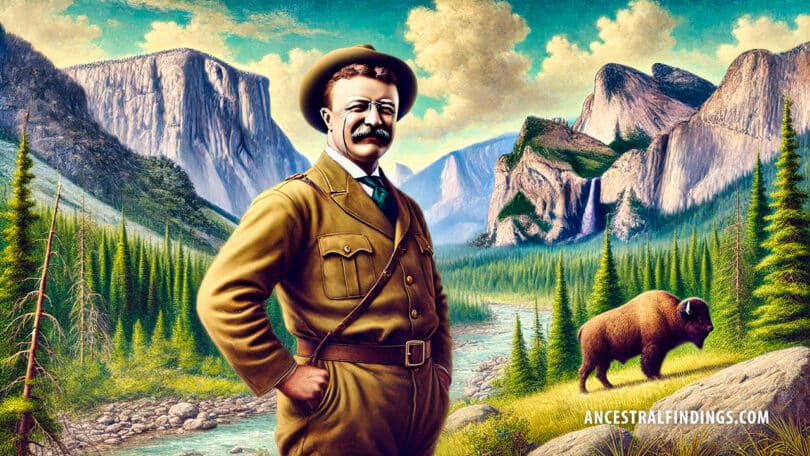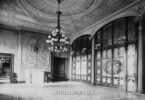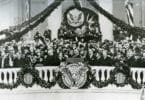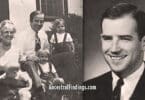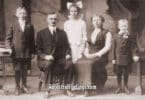Theodore Roosevelt Jr. was born in New York City on October 27, 1858, to Theodore Roosevelt Sr. and Martha Bulloch Roosevelt. The Roosevelt family was wealthy and influential, with a public service and philanthropy legacy. Despite their affluence, young Theodore, known as “Teedie,” struggled with severe asthma and other health issues, which often left him bedridden.
Roosevelt’s father, whom he deeply admired, encouraged him to build his physical strength to overcome his ailments. Following this advice, Roosevelt embarked on a rigorous physical exercise regimen, including boxing, hiking, and horseback riding. This commitment to physical fitness improved his health and instilled in him a lifelong passion for the outdoors and adventure.
Education and Early Career
Roosevelt’s education began at home, where he developed a keen interest in natural history. He later attended Harvard University, graduating in 1880 with honors. While at Harvard, Roosevelt began his lifelong interest in writing and published his first book, “The Naval War of 1812,” which received critical acclaim for its thorough research and analysis.
After Harvard, Roosevelt briefly attended Columbia Law School but found the study of law unfulfilling. Instead, he pursued a career in public service, driven by a sense of duty and a desire to make a difference.
Personal Life and Tragedy
In 1880, Roosevelt married Alice Hathaway Lee, and the couple had one daughter, Alice Lee Roosevelt. Tragedy struck on February 14, 1884, when both Roosevelt’s wife, Alice, and his mother, Martha, died on the same day. Overwhelmed with grief, Roosevelt retreated to the Badlands of North Dakota, where he lived as a rancher and pursued his love for the outdoors. This period of his life helped him recover from his personal loss and reinforced his rugged individualism and resilience.
Return to Poli United Statistics and Rise to Prominence
Roosevelt returned to New York in 1886 and re-entered politics with renewed vigor. He married Edith Kermit Carow in 1886, and together they had five children: Theodore Jr., Kermit, Ethel, Archibald, and Quentin. Edith provided Roosevelt with a stable and supportive home life, allowing him to pursue his political ambitions.
Roosevelt’s political career flourished as he took on various roles, including serving as a New York State Assemblyman, President of the New York City Police Board, and Assistant Secretary of the Navy. His leadership during the Spanish-American War, where he led the Rough Riders in the Battle of San Juan Hill, cemented his status as a national hero.
Path to the Presidency
In 1900, Roosevelt was chosen as President William McKinley‘s running mate. McKinley and Roosevelt won the election, but McKinley’s assassination in 1901 thrust him into the presidency at 42, making him the youngest president in American history.
Presidency (1901-1909)
Progressive Reforms
Roosevelt’s presidency was marked by his commitment to progressive reforms and his belief in using the federal government to address social and economic issues. He championed the “Square Deal,” which aimed to ensure fairness for workers, consumers, and businesses. Key components of his Square Deal included regulating corporations, protecting consumers, and conserving natural resources.
Trust-Busting
One of Roosevelt’s most notable achievements was his aggressive stance against monopolies and corporate trusts. He earned the nickname “Trust-Buster” for his efforts to break up large, powerful monopolies that he believed stifled competition and harmed consumers. Roosevelt’s administration filed numerous antitrust lawsuits, most famously against the Northern Securities Company, a major railroad trust.
Conservation Efforts
Roosevelt’s passion for the outdoors and conservation led to significant efforts to preserve America’s natural resources. He established the United States Forest Service and signed into law the creation of five national parks, 18 national monuments, and 150 national forests. His administration set aside over 230 million acres of public land for conservation, leaving a lasting legacy for future generations.
Foreign Policy and the Panama Canal
Roosevelt’s foreign policy was guided by the principle of “speak softly and carry a big stick,” emphasizing diplomacy backed by a strong military. One of his major accomplishments was the construction of the Panama Canal, which provided a crucial maritime shortcut between the Atlantic and Pacific Oceans. Roosevelt’s assertive actions in supporting Panama’s independence from Colombia and securing the canal zone showcased his willingness to use American power to achieve strategic goals.
Personal Traits and Character
Roosevelt’s larger-than-life personality and boundless energy were defining aspects of his character. He was known for his enthusiastic and often boisterous demeanor, intellectual curiosity, and love of learning. Roosevelt wrote extensively on many subjects, including history, politics, and nature, authoring more than 35 books during his lifetime.
Roosevelt’s dedication to physical fitness and adventure was legendary. He practiced boxing and jiu-jitsu in the White House, led strenuous hikes, and embarked on expeditions to explore remote regions. His adventurous spirit and love of the outdoors endeared him to the American public and reinforced his image as a robust and dynamic leader.
Post-Presidency and Later Life
After leaving office in 1909, Roosevelt embarked on a year-long expedition to Africa, hunting big game and collecting specimens for the Smithsonian Institution. Upon his return, he continued to be an influential voice in American politics, running for president again in 1912 as the candidate for the Progressive Party, also known as the “Bull Moose Party.” Although he lost the election, his campaign significantly impacted the political landscape.
In 1914, Roosevelt undertook another adventurous journey, this time exploring the River of Doubt in the Amazon rainforest. The expedition was fraught with danger, and Roosevelt’s health suffered as a result. Despite these challenges, he continued to write and advocate for progressive causes until his death on January 6, 1919, at the age of 60.
Legacy and Impact
Theodore Roosevelt’s legacy as a reformer, conservationist, and dynamic leader still endures. His progressive policies and efforts to regulate corporations, protect consumers, and conserve natural resources laid the groundwork for modern American governance. Roosevelt’s emphasis on a strong federal government and his belief in the government’s role in addressing social and economic issues influenced subsequent administrations and shaped the trajectory of American politics.
Roosevelt’s contributions to conservation are particularly notable. His efforts to preserve America’s natural landscapes and resources have had a lasting impact, ensuring that future generations can enjoy the nation’s natural beauty. National parks, forests, and monuments created during his administration continue to be treasured and protected.
Interesting Aspects of Roosevelt’s Presidency
The Great White Fleet
One of Roosevelt’s significant foreign policy initiatives was the deployment of the Great White Fleet, a group of 16 battleships that sailed around the world from 1907 to 1909. The fleet’s journey demonstrated America’s naval power and signaled its emergence as a global power. The expedition was a testament to Roosevelt’s belief in maintaining a strong military to support diplomatic efforts.
Nobel Peace Prize
In 1906, Roosevelt became the first American to be awarded the Nobel Peace Prize for mediating the Russo-Japanese War’s end. His efforts to broker peace between Russia and Japan showcased his commitment to diplomacy and international stability.
Theodore Roosevelt’s life and presidency represent a remarkable journey of resilience, reform, and dynamic leadership. From his early struggles with health issues to his rise as a national hero and influential president, Roosevelt’s story is about the power of determination and vision. His presidency was marked by significant progressive reforms, aggressive antitrust actions, and a commitment to conservation that left a lasting legacy. His larger-than-life personality and boundless energy continue to inspire and captivate the imagination of people worldwide.
Recommended Books on Theodore Roosevelt
“The Rise of Theodore Roosevelt” by Edmund Morris
This Pulitzer Prize-winning biography by Edmund Morris provides a detailed and engaging account of Roosevelt’s early life, rise to power, and presidency.
“Theodore Rex” by Edmund Morris
This is the second volume in Edmund Morris’s trilogy. It covers Roosevelt’s presidency and explores his significant achievements and challenges.
“Colonel Roosevelt” by Edmund Morris
This book, the final volume in Edmund Morris’s trilogy, details Roosevelt’s post-presidency years, including his African expedition and return to politics.
“The Wilderness Warrior: Theodore Roosevelt and the Crusade for America” by Douglas Brinkley
Douglas Brinkley’s biography focuses on Roosevelt’s conservation efforts and his dedication to preserving America’s natural landscapes.
“Mornings on Horseback” by David McCullough
This biography by David McCullough explores Roosevelt’s early life, including his family background, education, and formative experiences.

